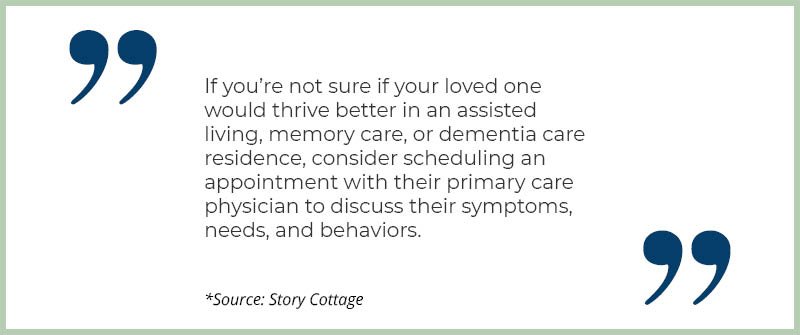What is Memory Care?
Considering memory care for an aging loved one typically brings up a lot of questions and even more concerns.
What exactly is memory care? How does it differ from dementia care? Can your loved one access memory care in their assisted living facility, or do they need to move to a memory care-oriented facility? Are there any memory care facilities that accept Medicare near me? How does Medicaid factor into all of this?
We hear you. Most of our patients’ families struggled with these same questions.
That’s why we’ve created this guide to memory care in Indiana. We’ll answer the most common questions we receive from the loved ones of those suffering from memory loss so that you can make an informed, measured, and confident decision for your loved one.

What Is Memory Care?
Memory care is a dedicated type of long-term care tailored specifically for those grappling with Alzheimer’s, dementia, and other conditions resulting in memory deterioration.
This service goes beyond traditional assisted living by providing an enriching, engaging, and secure environment to support individuals navigating the unique and varied challenges of memory-related illnesses.
Memory care homes typically provide structured activities, secure and accommodating lodging, and highly-trained, highly empathetic staff members that specialize in meeting the needs of individuals with memory loss.
Many memory care homes also offer benefits like:
- Physical therapy
- Medication management
- 24-hour staff supervision
- Memory-boosting activities
- Meal plan, prep, and service
- Monitoring medical conditions
- Assistance with personal grooming
- Housekeeping and laundry services
- Therapies that support strong memory
- Medical monitoring and medication management
- Social events, opportunities, and arrangements
What Is the Difference Between Memory Care and Dementia Care?
While both memory and dementia care aims to improve the experiences of individuals suffering from memory loss, there are a couple of key differences.
The primary difference between memory and dementia care is the scope of care provided.
Memory care homes are typically designed to support the lives of individuals that require support due to their memory loss challenges but retain enough function to handle or participate in day-to-day tasks without extreme difficulty.
Dementia care facilities, on the other hand, are usually designed for individuals suffering from advanced neurodegeneration. These facilities are equipped to support, uplift, and care for individuals with severe memory issues, making day-to-day tasks, responsibilities, and functions immensely challenging or impossible.
When to Move from Assisted Living to Memory Care?
Deciding when to move a loved one from assisted living to memory care can be challenging.
You don’t want to move your loved one sooner than necessary but also don’t want to wait for something unfortunate to happen to force your hand.
So what is one to do?
Difference Between Memory Care and Assisted Living
Fortunately, there are a number of tell-tale signs experts recommend families keep an eye out for that can signal a need to transition from one type of care facility to another. Let’s take a look at six of the top signals its time to transition from assisted living to memory care:
- Your loved one’s cognitive and physical needs begin to grow
- You notice, or the assisted living facility reports increased wandering, escape desires or attempts, and elopement
- Your loved one is experiencing frequent bouts of aggression, confusion, and forgetfulness
- Your loved one begins to struggle to navigate their assisted living facility, often finding themselves lost
- You or caregivers observe sudden changes in mood, eating habits, and socialization skills
- Your loved one’s assisted care facility approaches you about exploring alternative treatment options
What Is Memory Care in Assisted Living?
The difference between memory care and assisted living isn’t exactly black and white. For example, while not all assisted living facilities offer memory care, all memory care facilities provide assisted living services.
In fact, the powerful combination of memory care and assisted living describes the basis of most memory care facilities and providers. The benefits of assisted living include:
- Consistent routines
- 24/7 access to caregivers
- Exciting social opportunities
- Enhanced security features
The benefits of memory care, namely include:
- Personalized care plans
- Structured cognitive support
- 24/7 security and supervision
- Professional medication management
By combining the two, caregivers can provide multifaceted support that empowers individuals dealing with memory loss (often in addition to mobility, communication, cognitive, or physical disabilities) to lead engaged and fulfilling lives.
Does Medicaid Pay for Memory Care in Indiana?
While Indiana’s Medicaid program does include provisions to pay for in-home nursing care for low-income seniors, it does not cover “residential environments” or outline memory care requirements to qualify for support.
That means most memory care homes, facilities, and communities will not qualify for Medicaid support. However, low-income seniors in Indiana may still be able to receive government assistance if they qualify for one of the state’s many Medicaid Waivers.
How Much Does Medicare Pay for Memory Care Facilities?
Unfortunately, Indiana’s Medicare program does not cover memory care facility costs for Indianans over 65 — so don’t waste time searching for “memory care facilities near me that accept Medicare and Medicaid.”
However, much like the state Medicaid program discussed above, there are opportunities for certain seniors to score support for their memory care for these programs.
If you’re considering memory care for a low-income senior or individual over 65, be sure to explore Indiana’s numerous Medicare and Medicaid waivers. Funds received through these waivers, like the Aged and Disabled Waiver, can often be applied to memory care facilities after approval.
Is Memory Care the Same as Alzheimer’s?
Memory care can be a great solution for individuals suffering from Alzheimer’s.
Much like dementia, the fit, effectiveness, and impact of memory care for individuals with Alzheimer’s will largely depend on their ability to engage and participate in some amount of day-to-day tasks, like communicating, personal grooming, dressing, eating, and socializing.
If an individual’s Alzheimers has advanced to the point that they need assistance with these daily tasks, they may be better suited to a dementia care facility. Dementia care facilities are better equipped to provide intensive, round-the-clock care to individuals with advanced memory impairment.

If you’re not sure if your loved one would thrive better in an assisted living, memory care, or dementia care residence, consider scheduling an appointment with their primary care physician to discuss their symptoms, needs, and behaviors. You can also contact local memory care facilities (search “memory care facilities near me” or use an old-fashioned memory care directory) to discuss your loved one’s circumstances with an expert and receive live feedback, insights, and guidance.
Is It Better to Keep Someone with Dementia at Home?
After you’ve experienced the challenges that come with memory loss first-hand, it can be challenging to trust someone else with your loved one’s care.
After all, is a memory care facility really going to be equipped to provide the personalized care, empathetic attention, and structured support your loved one needs to lead a happy, engaging, and fulfilling life?
Generally speaking, the answer is a resounding yes. Reputable memory care homes with strong track records of providing quality care and well-trained teams can often provide services and support that family and friends simply can’t match.
When paired with private, comfortable residences designed and built for individuals with memory impairment, loss, or challenges, the appeal of partnering with a memory care provider grows even more compelling.
While the decision should always be weighed carefully and include input from everyone involved (including your loved one with memory challenges, if possible), many families regret not taking advantage of memory care residences earlier in their loved one’s struggles with Alzheimer’s or dementia.
Story Cottage: Indiana’s Leading Memory Care Community
Story Cottages are unique, first-of-its-kind residences for individuals navigating memory loss.
Our comfortable, private, and secure memory care homes provide individuals struggling with memory loss with customized accommodations, multiple layers of security, and empathetic support from passionate and nurturing nurses, caregivers, and house managers.
Paired with personalized care, social support, and an emphasis on engagement, our residents are able to lead comfortable, dignified, and fulfilling lives in our private care homes.
To learn more about our locations in Indianapolis or Carmel, contact us today!